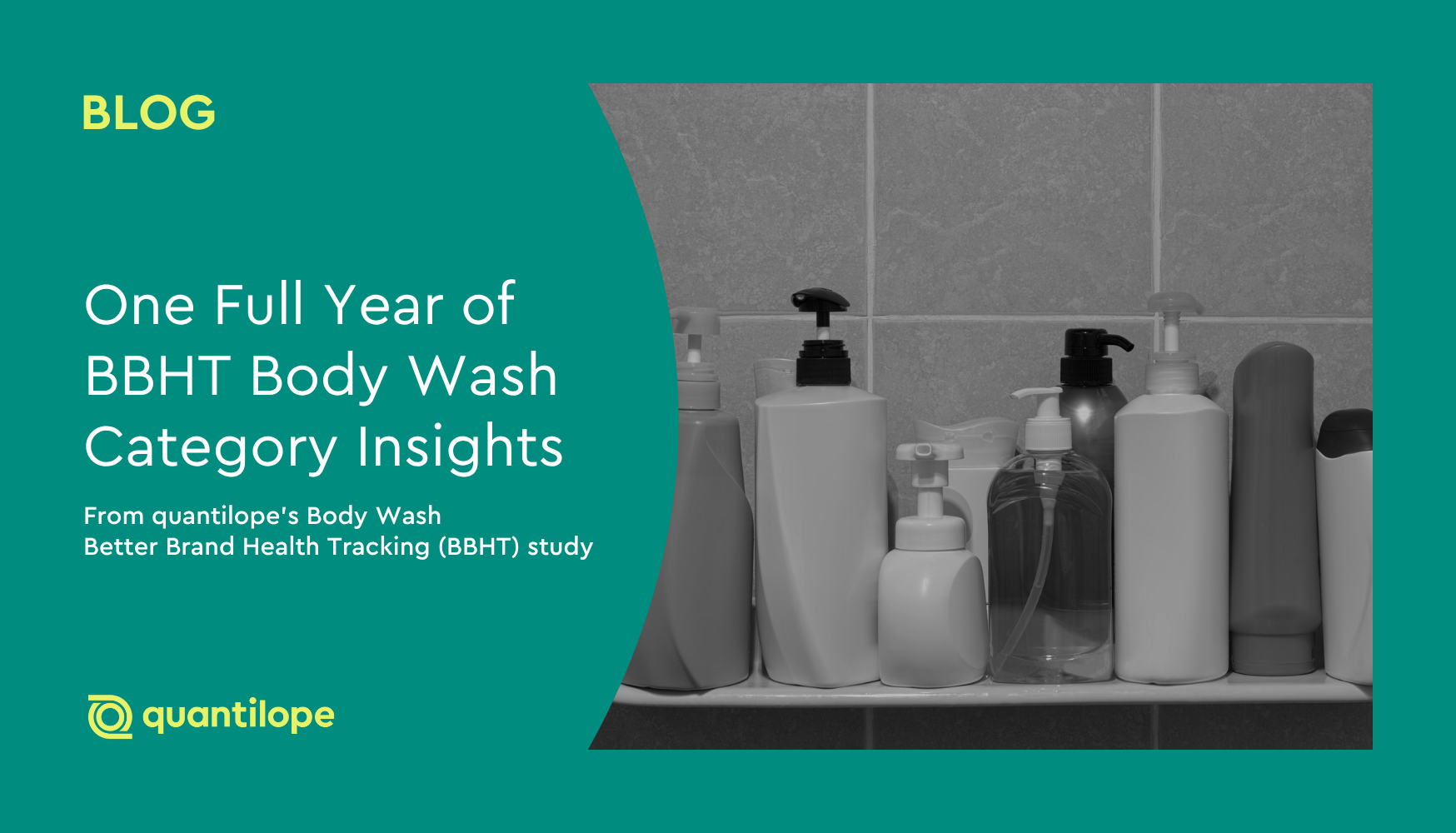In this blog post, learn why you should always tie your research efforts back to overall company strategy to maintain corporate-level consistency, cost efficiencies, and more.
Table of Contents:
- Cohesive strategic alignment
- Buildable context
- Cost efficiencies
- Resource efficiencies
- Growth opportunities
- Customer retention
- Strategic research with quantilope
Most organizations have siloed business units, each with dedicated responsibilities and initiatives. Sales teams focus on the numbers and market share, supply chain on resource allocation, marketing on strategic planning, and product development on new product planning (just to name a few potential departments). While each team’s core values are individually important to the business, all market research efforts need to tie back to one cohesive corporate-level strategy for effective growth across the organization.
When business units construct research initiatives without basing them back to broader corporate-level strategy, the insights don’t build up to one relevant, actionable story that the business can use for growth. Instead, the piecemeal insights sit untouched, collecting dust; and as you might imagine, that’s a stakeholder’s worst nightmare.
To further convince you to always tie your research back to company strategy, below are six specific reasons why:
Cohesive strategic alignment
Any time you run market research, you need to make sure that what you’re testing, how you’re testing, and who you’re testing amongst all ties back to your company strategy.
It’s not enough to know whether or not your respondents simply like or use your product or service. Beyond these surface-level insights, you’ll want to know if consumers are gravitating toward your products because they align with your strategic company objectives (i.e. promoting inclusivity, working toward a more sustainable future, etc.).
If consumers are buying from your brand but not for the reasons you’ve built your brand mission around, you could be setting yourself up for failure in the long term as different pieces of your portfolio slowly shift in different directions. Market research studies that ground insights on a company-aligned strategy are one simple way to avoid that kind of mistake.
Say for example you drafted a questionnaire without considering the overall business strategy to improve company sustainability. Your results may come back without any insights related to sustainable improvements, no data from respondents who care about sustainability, and no sustainability action items for stakeholders to review. That leaves you with a study that cost your team valuable budget, but that you can’t do anything with. Now consider a study that bases all questions around sustainable efforts and segments users into those who prioritize sustainability and those who don’t. Already you have a much more actionable dashboard for stakeholders to leverage in their strategic planning.
Buildable Context
When you have a study grounded in long-term goals for the business, you can build a well-rounded story from the insights that tie to the big picture. On the contrary, when you launch a study without considering those business goals, you might be left with insights here and there that each tell you something interesting, but don’t create a buildable story for stakeholders.
The better an insights/marketing team can tell a story from its dataset, the more traction it will gain among stakeholders to guide their decision-making and plan of action. It will be much easier for said insights/marketing teams to craft an impactful story when a study is based on corporate strategy KPIs vs. metrics that just form one piece of a larger puzzle (say, only include insights for one business area or one sector of your target market).
A research study’s dashboard should tell a story from the insights gathered through various survey sections. Insights from one section of the study might be further supported by insights from another, generating a much stronger company-level takeaway.
Back to Table of Contents
Cost Efficiencies
When you link research back to company strategy, there’s less chance the findings will be unactionable (in which case you’d have to re-run the study for fresh insights - aka, a redo). Narrowing in on company strategy as you build your research project sets you up for successful results that you can act on quickly, making the most of your money from a single study.
There’s also a cost efficiency to consider in that multiple teams across your organization may be able to leverage the insights from a single study (since it’s tied to one central strategy). So rather than having the marketing team, insights team, and product development teams run independent market research studies, the insights from one study can instead generate impact across all three teams.
Back to Table of Contents
Resource Efficiencies
Similar to the above cost efficiencies in using one study across teams, a corporate-strategy-based research study also saves valuable resources in terms of operations and productivity hours. When a study is tied to strategic planning for the business at large, it’s likely one study will produce actionable insights for multiple teams (as mentioned above in terms of cost efficiencies). What this also means is that multiple teams are not duplicating efforts when it comes to research. By freeing up resources from research efforts, individuals within the organization can re-focus their efforts on other business objectives that promote growth.
Let’s consider an individual team member on the marketing team who spends hours each day reviewing study results. Unknowingly, their colleague on the insights team was doing the same thing, reviewing results for a different project. It comes to their attention that they’re both spending a large number of hours on a task that could be made more efficient if one of them owned the study, but based the insights on overall company objectives. So, the insights colleague takes over ownership of the study, and the marketing colleague is freed up to work on marketing collateral, Linkedin campaigns, branding efforts, and so on. Both teams still get the relevant insights they need but in a much more efficient manner.
Back to Table of Contents
Growth Opportunities
It’s fair to say that companies want to grow in the long term. To do so, they need to understand the short-term market and the opportunities available at any given time. Basing a research study on a corporate-level strategy informs the business about where to currently invest new resources, where to scale back, and which new markets or product lines to explore next.
For example, for a business with the company-wide strategic goal of multiplying their product lines, a research study might ask their target audience about potential interest in new product prototypes, openness to new technologies, what would convince a first-time buyer to invest in their company’s products, and so on.
Meanwhile, another company’s business model might be built on a competitive strategy roadmap. This company would include questions in their market research study that ask about competitive brand awareness, usage, pricing, and more. As a result, the company knows which areas to focus on to provide value where competitors currently do not.
A final example here would be a company with corporate initiatives centered on product partnerships. This could be a company perhaps in the CPG space that’s looking to partner up with another snack company for a limited-time flavor option. The study would include questions about the target market’s flavor preferences, favorite snack brands, snack package options, and more, to understand which other snack brands might be a good fit to partner with.
Back to Table of Contents
Customer Retention
Lastly, crafting a study around strategic company insights will be what generates actionable findings among your target market so you can focus on value creation for those customers. When customers are happy, they stay with your brand in the long term as loyal customers. In fact, it becomes hard for them to ever turn back to competitors when your business is listening to (and acting on) all their wants and needs.
However, customer retention is only possible if your research insights are reflective of your true target audience - one that’s determined based on your overall corporate strategy. It’s one thing to capture insights and act on respondent feedback so they stick with your business, but only if those respondents are the ones actually buying your products and services in the real world. That’s why it’s so important all your research efforts are grounded in your company-wide business plan so you’re not wasting valuable time and resources trying to retain the wrong customers or promote the wrong products.
Back to Table of Contents
Strategic research with quantilope
Whether your business strategy is to generate a competitive advantage against a key competitor, work on your product differentiation, build market share, establish corporate partnerships, or work on company sustainability, your research should always be centered around those initiatives.
quantilope’s Consumer Intelligence Platform offers templated surveys for a variety of research needs, 15 automated advanced methodologies, and dedicated support from a team of classically-trained researchers. Whatever your strategic goals may be, drag & drop relevant questions into your survey that will provide insights into those goals, launch your survey, and watch results populate your analysis charts in real-time...all without ever leaving quantilope’s end-to-end platform.
Ready to start building an actionable insights survey that feeds into your overall corporate strategy and generates real impact? Get in touch below, and let’s chat!




